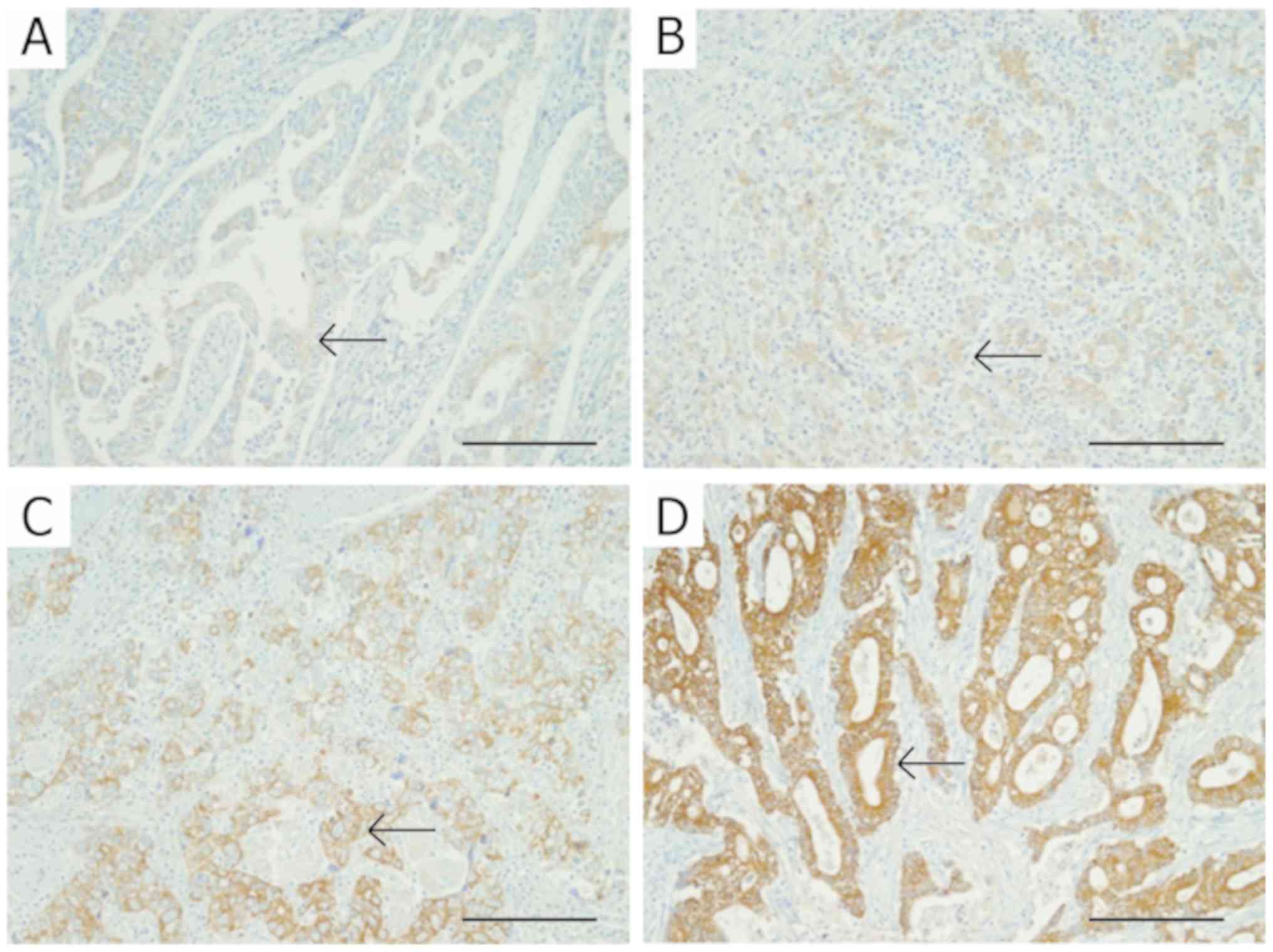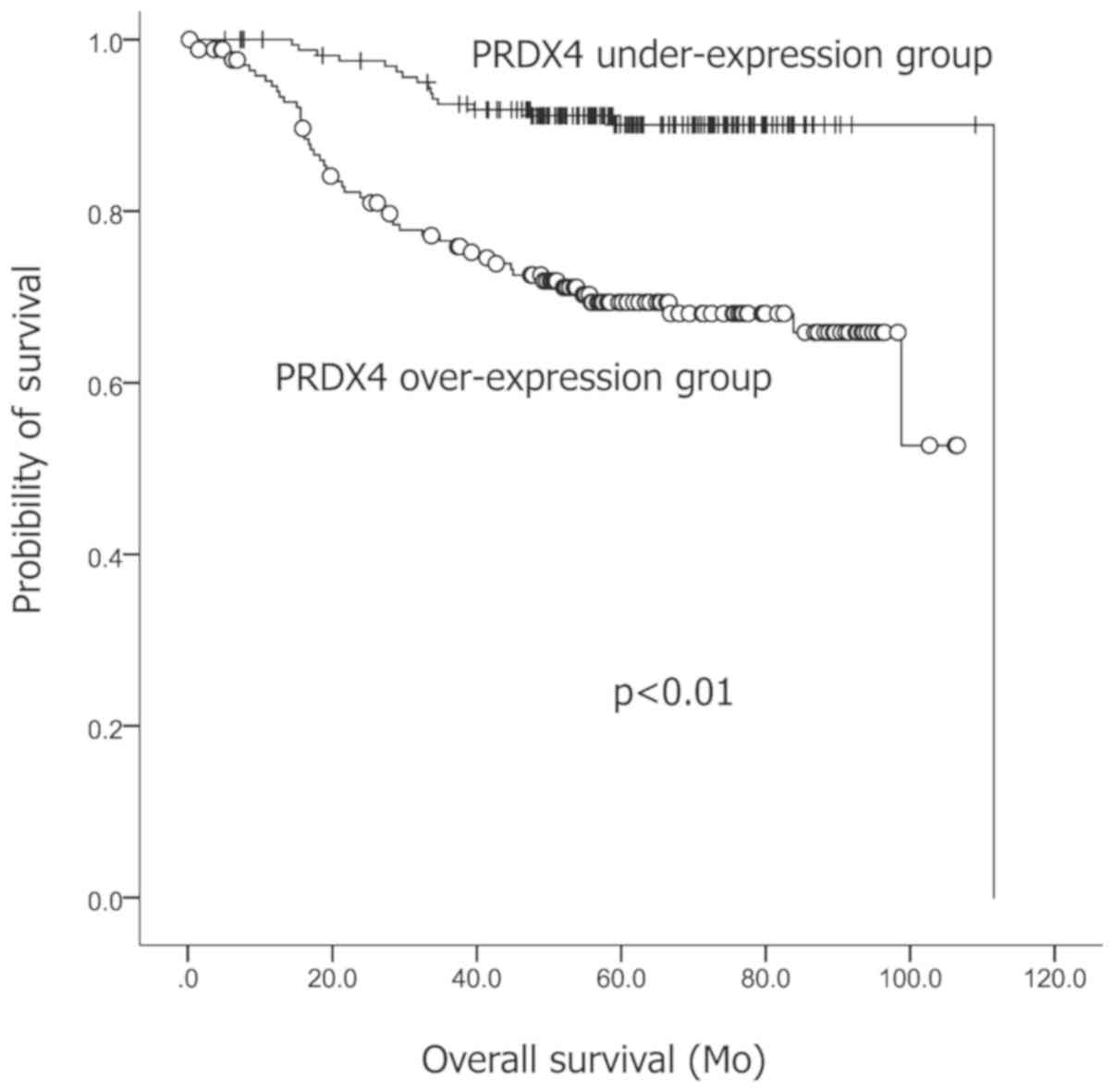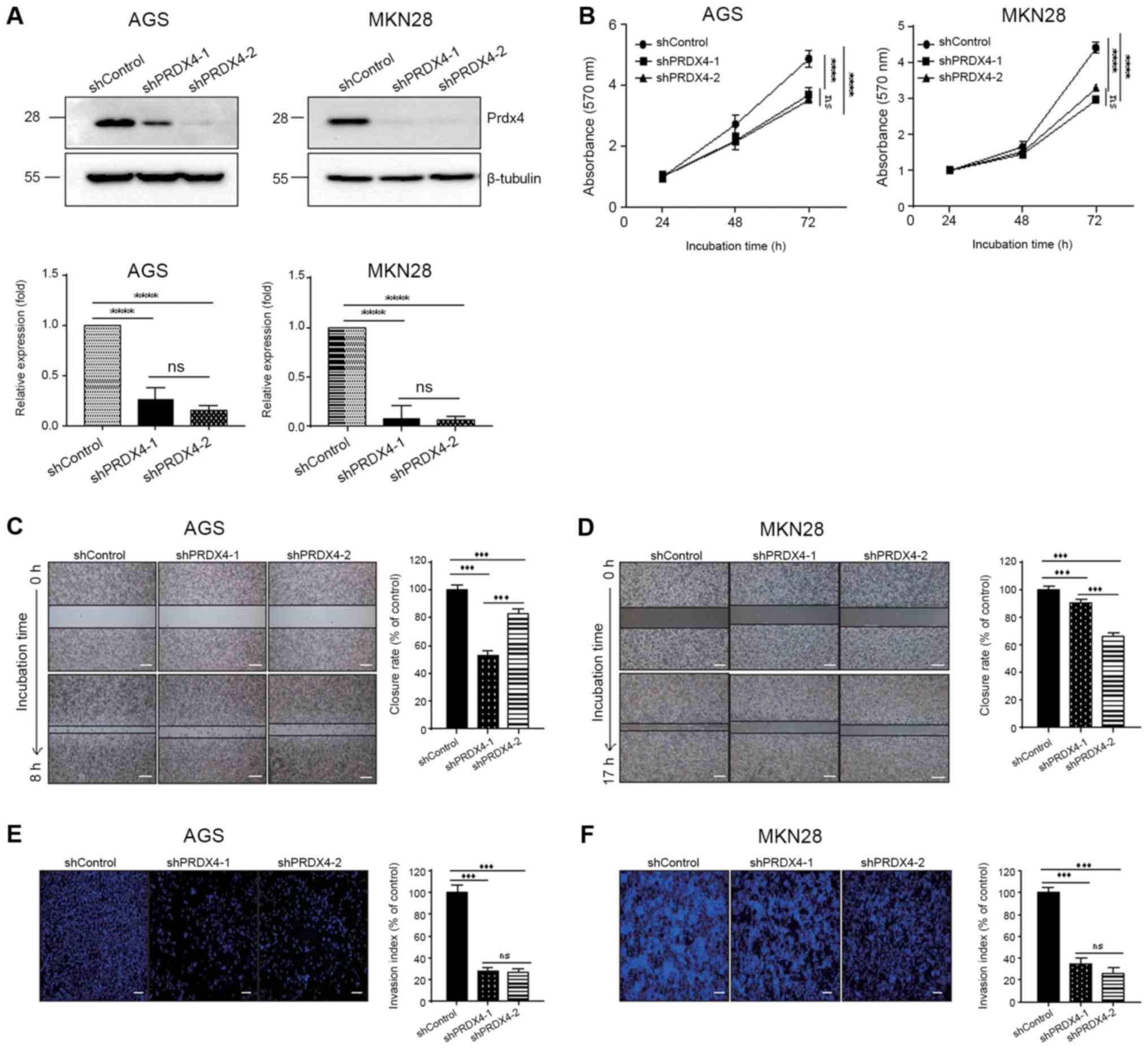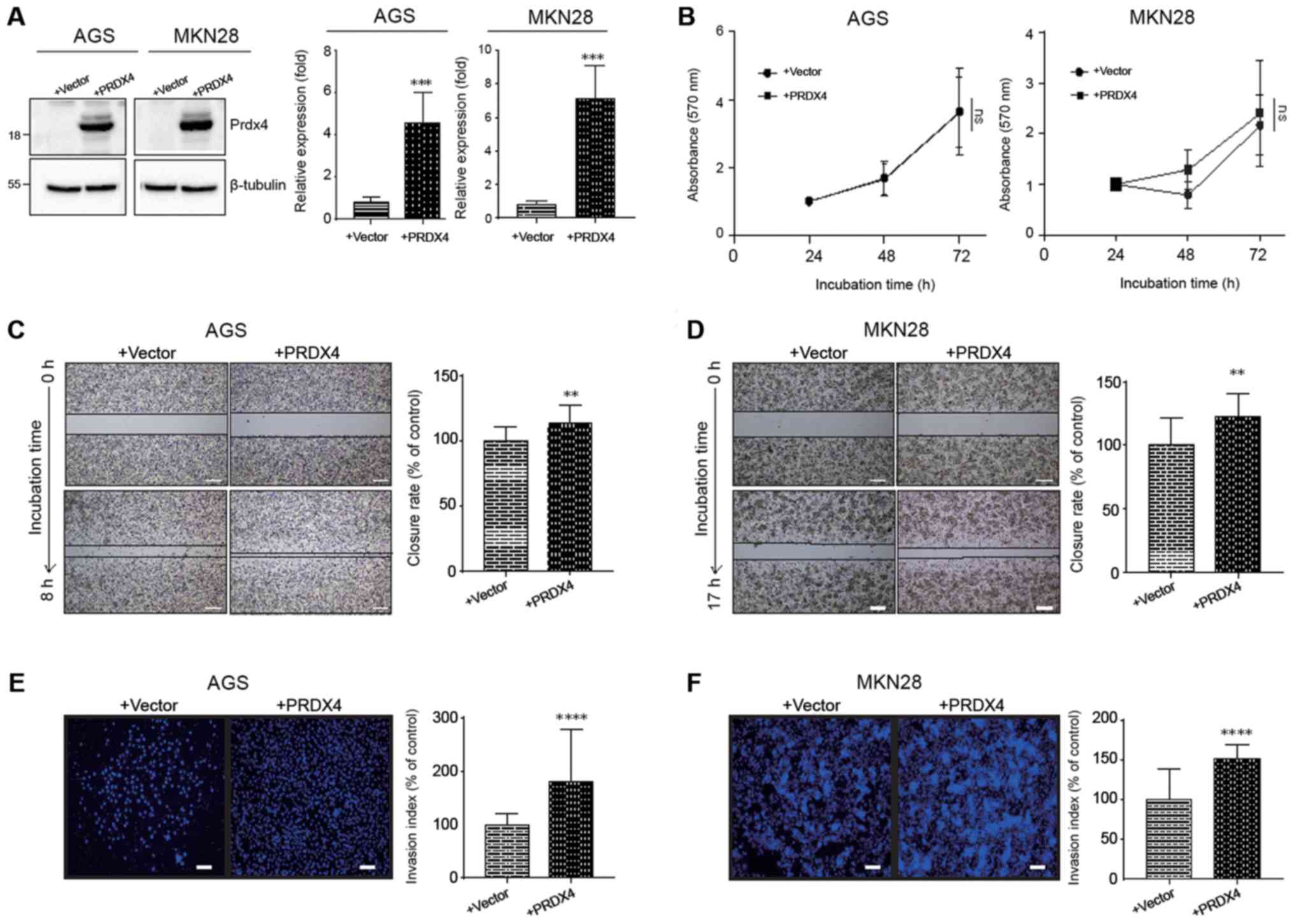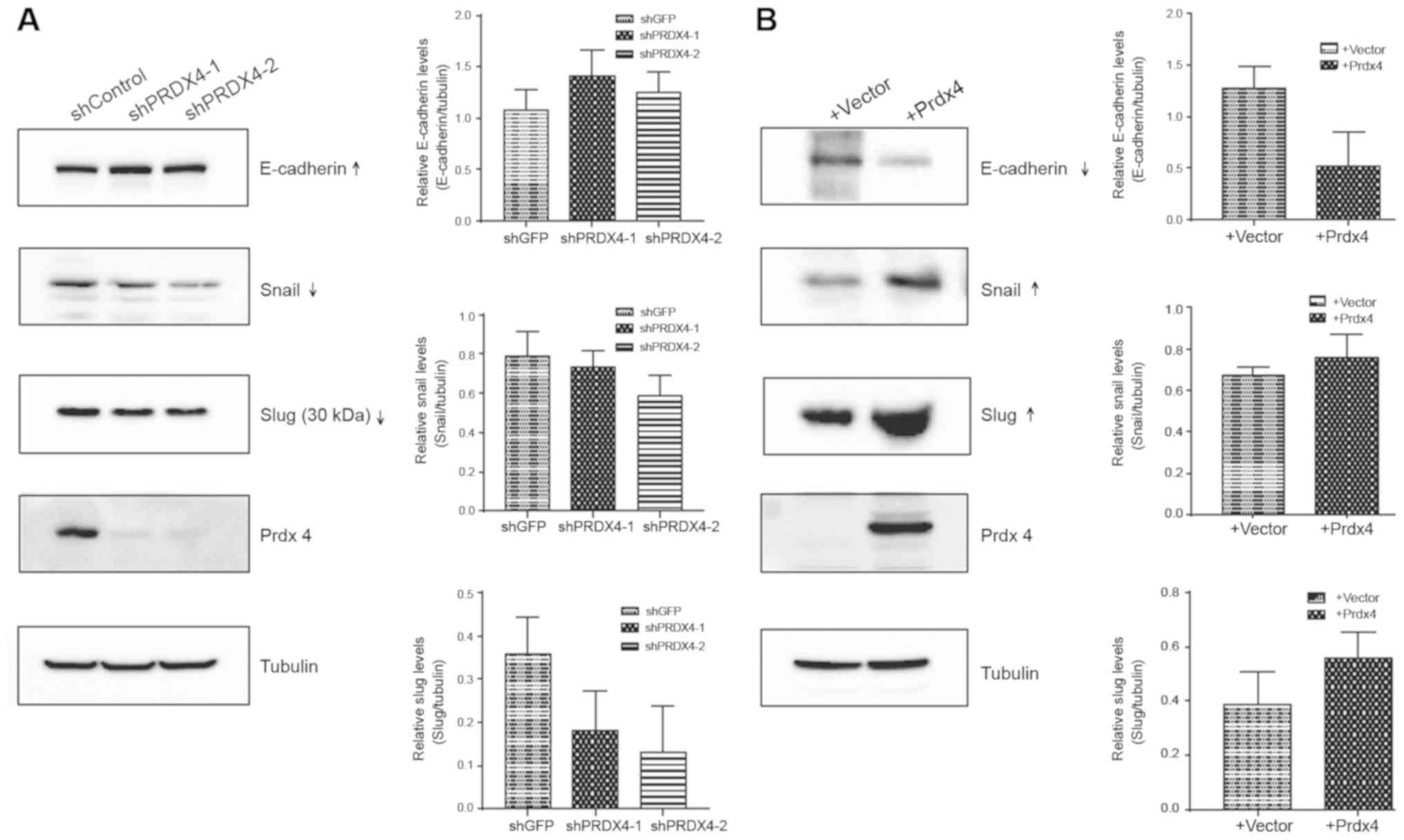|
1
|
Kamangar F, Dores GM and Anderson WF:
Patterns of cancer incidence, mortality, and prevalence across five
continents: Defining priorities to reduce cancer disparities in
different geographic regions of the world. J Clin Oncol.
24:2137–2150. 2006. View Article : Google Scholar : PubMed/NCBI
|
|
2
|
Ferlay J, Soerjomataram I, Dikshit R, Eser
S, Mathers C, Rebelo M, Parkin DM, Forman D and Bray F: Cancer
incidence and mortality worldwide: Sources, methods and major
patterns in GLOBOCAN 2012. Int J Cancer. 136:E359–E386. 2015.
View Article : Google Scholar : PubMed/NCBI
|
|
3
|
Noh SH, Park SR, Yang HK, Chung HC, Chung
IJ, Kim SW, Kim HH, Choi JH, Kim HK, Yu W, et al: Adjuvant
capecitabine plus oxaliplatin for gastric cancer after D2
gastrectomy (CLASSIC): 5-year follow-up of an open-label,
randomised phase 3 trial. Lancet Oncol. 15:1389–1396. 2014.
View Article : Google Scholar : PubMed/NCBI
|
|
4
|
Sakuramoto S, Sasako M, Yamaguchi T,
Kinoshita T, Fujii M, Nashimoto A, Furukawa H, Nakajima T, Ohashi
Y, Imamura H, et al: Adjuvant chemotherapy for gastric cancer with
S-1, an oral fluoropyrimidine. N Engl J Med. 357:1810–1820. 2007.
View Article : Google Scholar : PubMed/NCBI
|
|
5
|
Bang YJ, Van Cutsem E, Feyereislova A,
Chung HC, Shen L, Sawaki A, Lordick F, Ohtsu A, Omuro Y, Satoh T,
et al: Trastuzumab in combination with chemotherapy versus
chemotherapy alone for treatment of HER2-positive advanced gastric
or gastro-oesophageal junction cancer (ToGA): A phase 3,
open-label, randomised controlled trial. Lancet. 376:687–697. 2010.
View Article : Google Scholar : PubMed/NCBI
|
|
6
|
Shitara K and Ohtsu A: Ramucirumab for
gastric cancer. Expert Rev Gastroenterol Hepatol. 9:133–139. 2015.
View Article : Google Scholar : PubMed/NCBI
|
|
7
|
Tabernero J, van Cutsem E, Bang YJ, Fuchs
CS, Wyrwicz L, Lee KW, Kudaba I, Marcelo Garrido M, Chung HC,
Castro Salguero HR, et al: Pembrolizumab with or without
chemotherapy vs chemotherapy in advanced gastric or GEJ
adenocarcinoma. Int J Clin Oncol. 37:2019.
|
|
8
|
Paik S, Tang G, Shak S, Kim C, Baker J,
Kim W, Cronin M, Baehner FL, Watson D, Bryant J, et al: Gene
expression and benefit of chemotherapy in women with node-negative,
estrogen receptor-positive breast cancer. J Clin Oncol.
24:3726–3734. 2006. View Article : Google Scholar : PubMed/NCBI
|
|
9
|
Yamanaka T, Oki E, Yamazaki K, Yamaguchi
K, Muro K, Uetake H, Sato T, Nishina T, Ikeda M, Kato T, et al:
12-Gene recurrence score assay stratifies the recurrence risk in
stage II/III colon cancer with surgery alone: The SUNRISE Study. J
Clin Oncol. 34:2906–2913. 2016. View Article : Google Scholar : PubMed/NCBI
|
|
10
|
Cheong JH, Yang HK, Kim H, Kim WH, Kim YW,
Kook MC, Park YK, Kim HH, Lee HS, Lee KH, et al: Predictive test
for chemotherapy response in resectable gastric cancer: A
multi-cohort, retrospective analysis. Lancet Oncol. 19:629–638.
2018. View Article : Google Scholar : PubMed/NCBI
|
|
11
|
Lim BH, Cho BI, Kim YN, Kim JW, Park ST
and Lee CW: Overexpression of nicotinamide N-methyltransferase in
gastric cancer tissues and its potential post-translational
modification. Exp Mol Med. 38:455–465. 2006. View Article : Google Scholar : PubMed/NCBI
|
|
12
|
Rhee SG, Chae HZ and Kim K:
Peroxiredoxins: A historical overview and speculative preview of
novel mechanisms and emerging concepts in cell signaling. Free
Radic Biol Med. 38:1543–1552. 2005. View Article : Google Scholar : PubMed/NCBI
|
|
13
|
Schulte J: Peroxiredoxin 4: A
multifunctional biomarker worthy of further exploration. BMC Med.
9:1372011. View Article : Google Scholar : PubMed/NCBI
|
|
14
|
Jia W, Chen P and Cheng Y: PRDX4 and its
roles in various cancers. Technol Cancer Res Treat.
18:15330338198643132019. View Article : Google Scholar : PubMed/NCBI
|
|
15
|
Kong D, Li Y, Wang Z and Sarkar FH: Cancer
stem cells and epithelial-to-mesenchymal transition
(EMT)-phenotypic cells: Are they cousins or twins? Cancers (Basel).
3:716–729. 2011. View Article : Google Scholar : PubMed/NCBI
|
|
16
|
Gillies RJ, Verduzco D and Gatenby RA:
Evolutionary dynamics of carcinogenesis and why targeted therapy
does not work. Nat Rev Cancer. 12:487–493. 2012. View Article : Google Scholar : PubMed/NCBI
|
|
17
|
Klein TJ and Glazer PM: The tumor
microenvironment and DNA repair. Semin Radiat Oncol. 20:282–287.
2010. View Article : Google Scholar : PubMed/NCBI
|
|
18
|
Monteiro G, Horta BB, Pimenta DC, Augusto
O and Netto LE: Reduction of 1-Cys peroxiredoxins by ascorbate
changes the thiol-specific antioxidant paradigm, revealing another
function of vitamin C. Proc Natl Acad Sci USA. 104:4886–4891. 2007.
View Article : Google Scholar : PubMed/NCBI
|
|
19
|
Kim SY, Jo HY, Kim MH, Cha YY, Choi SW,
Shim JH, Kim TJ and Lee KY: H2O2-dependent hyperoxidation of
peroxiredoxin 6 (Prdx6) plays a role in cellular toxicity via
up-regulation of iPLA2 activity. J Biol Chem. 283:33563–33568.
2008. View Article : Google Scholar : PubMed/NCBI
|
|
20
|
Ishii T, Warabi E and Yanagawa T: Novel
roles of peroxiredoxins in inflammation, cancer and innate
immunity. J Clin Biochem Nutr. 50:91–105. 2012. View Article : Google Scholar : PubMed/NCBI
|
|
21
|
Siracusano A, Rigano R, Ortona E, Profumo
E, Margutti P, Buttari B, Delunardo F and Teggi A: Immunomodulatory
mechanisms during Echinococcus granulosus infection. Exp Parasitol.
119:483–489. 2008. View Article : Google Scholar : PubMed/NCBI
|
|
22
|
Kinnula VL, Lehtonen S, Sormunen R,
Kaarteenaho-Wiik R, Kang SW, Rhee SG and Soini Y: Overexpression of
peroxiredoxins I, II, III, V, and VI in malignant mesothelioma. J
Pathol. 196:316–323. 2002. View Article : Google Scholar : PubMed/NCBI
|
|
23
|
Riddell JR, Bshara W, Moser MT, Spernyak
JA, Foster BA and Gollnick SO: Peroxiredoxin 1 controls prostate
cancer growth through Toll-like receptor 4-dependent regulation of
tumor vasculature. Cancer Res. 71:1637–1646. 2011. View Article : Google Scholar : PubMed/NCBI
|
|
24
|
Chang XZ, Li DQ, Hou YF, Wu J, Lu JS, Di
GH, Jin W, Ou ZL, Shen ZZ and Shao ZM: Identification of the
functional role of peroxiredoxin 6 in the progression of breast
cancer. Breast Cancer Res. 9:R762007. View
Article : Google Scholar : PubMed/NCBI
|
|
25
|
Ho JN, Lee SB, Lee SS, Yoon SH, Kang GY,
Hwang SG and Um HD: Phospholipase A2 activity of peroxiredoxin 6
promotes invasion and metastasis of lung cancer cells. Mol Cancer
Ther. 9:825–832. 2010. View Article : Google Scholar : PubMed/NCBI
|
|
26
|
Nicolussi A, D'Inzeo S, Capalbo C,
Giannini G and Coppa A: The role of peroxiredoxins in cancer. Mol
Clin Oncol. 6:139–153. 2017. View Article : Google Scholar : PubMed/NCBI
|
|
27
|
Karihtala P, Mantyniemi A, Kang SW,
Kinnula VL and Soini Y: Peroxiredoxins in breast carcinoma. Clin
Cancer Res. 9:3418–3424. 2003.PubMed/NCBI
|
|
28
|
Yu W, Wu J, Ning ZL, Liu QY and Quan RL:
High expression of peroxiredoxin 1 is associated with
epithelial-mesenchymal transition marker and poor prognosis in
gastric cancer. Med Sci Monit. 24:2259–2270. 2018. View Article : Google Scholar : PubMed/NCBI
|
|
29
|
Hay ED: An overview of
epithelio-mesenchymal transformation. Acta Anat (Basel). 154:8–20.
1995. View Article : Google Scholar : PubMed/NCBI
|
|
30
|
Lamouille S, Xu J and Derynck R: Molecular
mechanisms of epithelial-mesenchymal transition. Nat Rev Mol Cell
Biol. 15:178–196. 2014. View Article : Google Scholar : PubMed/NCBI
|
|
31
|
Kim B, Kim YS, Ahn HM, Lee HJ, Jung MK,
Jeong HY, Choi DK, Lee JH, Lee SR, Kim JM and Lee DS: Peroxiredoxin
5 overexpression enhances tumorigenicity and correlates with poor
prognosis in gastric cancer. Int J Oncol. 51:298–306. 2017.
View Article : Google Scholar : PubMed/NCBI
|















